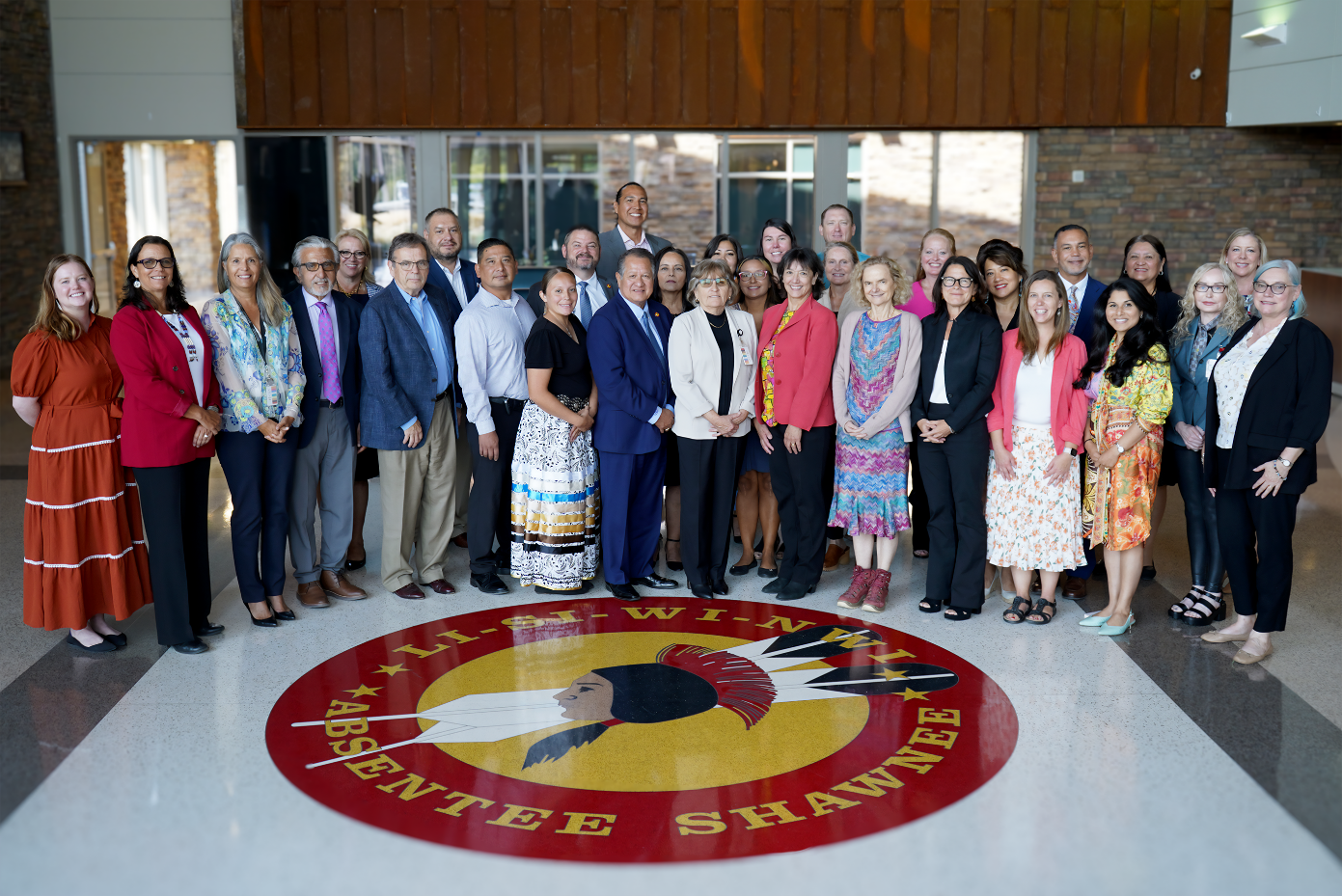
On Wednesday, July 30, 2024, the National Institutes of Health (NIH) awarded the Absentee Shawnee Tribal (AST) Health System with the first NIH Native Collective Research Effort to Enhance Wellness (N Crew) Program Grant.
The proposal was met with enthusiasm and was followed up by a site visit by senior NIH leadership, including NIH Director, Dr. Monica M. Bertagnolli, M.D., National Institute of Drug Abuse Director, Nora Volkow, M.D, Associate Director for Data Science and Director of the Office of Data Science Strategy, Dr. Susan Gregurick, Director of the NIH Tribal Health Research Office, Dr. Karina Walters, and Assistant Director of Science Administration of the National Institute of Neurological Disorders and Stroke, Dr. Rita Devine. This was the first visit to a tribal health system by the director of the NIH in at least 15 years.
The AST Health System competed against many other tribal entities nationally for this award. The effort was spearheaded by Oklahoma Foundation for Digestive Research President and Medical Director, Dr. Philip Miner, M.D., AST Health System Behavioral Health Medical Director, Dr. Siavash Nael, M.D., AST Health System Director of Behavioral Health Grants, Dr. Hadyn K. Paternite, Ph.D, MSN, RN, and Swiss Tropical and Public Health Institute Epidemiologist, Dr. Aliya Karim, Ph.D.
The NIH N Crew Program focuses on supporting research prioritized and focusing on Native communities while integrating Indigenous knowledge and culture, enhancing research capacity led by
Native American Tribes and Native American-serving organizations through training, resources, and tools; and improving access and the quality of data on substance abuse, pain, and related factors to better help Native communities. Native approaches to pain management are expected to be integrated into the final program.
“This research will pave the road not only for pain management and how to deal with chronic pain and how we look at the roots of the problem, but how people develop chronic pain and how they handle it and what happened to them,” Dr. Siavash Nael said.
The health system’s research team will expand upon a novel systems-based, mixed-methods research approach specific to community health systems of vulnerable populations, incorporating third-party data from the local Native community within the first two years to build their research model.
“One of the first steps that we will take is the collective development of an AST-oriented AI/IN community health systems framework that will be specific to behavioral health,” Dr. Aliya Karim announced. “The program is multi-pronged, and we ultimately hope to understand a few things. First, where do we see attrition of cases across the trajectory of care for behavioral health issues like substance abuse or pain management — care seeking, diagnosis, treatment, follow-up, etc.? Second, what modifiable and non-modifiable systemic, demographic, policy or contextual factors are contributing to the onset, diagnosis, and treatment of the behavioral health issue? It is not simply that native voices are “a part” of this research initiative — they design the very tools that we will use for evaluation.”
The NIH N CREW program will be conducted in two phases:
Phase one lasts two years and will support projects that plan, develop, and lead Native community-driven research and/or data improvement projects with a focus on substance abuse and pain. NIH will also support the development of a Native Research Resource Network to provide comprehensive training, resources, and real-time support to N Crew participants to support research projects.
The AST will be eligible to compete in the second, five-year phase, expected to start in fall 2026, which will build on the first phase to further develop Native community-driven research and/or data improvement projects. Total available finding for phase two is $268 million.
The AST Health System behavioral health department is not contributing to this program alone. There will be a conference on September 22nd, 2024 in Minneapolis, MN where the AST grant team will work with 14 other tribal-affiliated organizations who received NIH N Crew grants to discuss how to build that network and support one another in this effort to develop a nation-wide research network.
“One of the things I love about this program is that everyone isn’t reinventing the wheel, we’re not working in isolation, but as an interactive community where we can discuss the challenges, trade ideas, and share common resources,” Dr. Hadyn Paternite said






